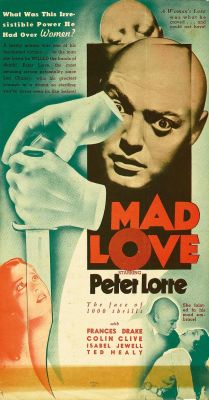 In Karl Freund’s Mad Love (1935), a madman, Doctor Gogol (Peter Lorre), falls in love with an actress: Yvonne Orlac (Frances Drake). However, Gogol’s love for Yvonne is not a healthy or normal kind of love. It is obsessive.
In Karl Freund’s Mad Love (1935), a madman, Doctor Gogol (Peter Lorre), falls in love with an actress: Yvonne Orlac (Frances Drake). However, Gogol’s love for Yvonne is not a healthy or normal kind of love. It is obsessive.
Obsessive love is born of the need to fill a void in one’s life. According to Susan Forward, “Obsessive love has little to do with love at all—it has to do with longing.”1 Doctor Gogol, who has “never known the love of a woman” tried to find meaning in life as a surgeon, yet despite being “great” and “famous”, he still feels incomplete. When he discovers Yvonne the actress, he watches her perform in the theatre—47 nights in a row. Emotionally damaged by a lifetime of rejection, Gogol is obsessed with Yvonne because of the emptiness he feels inside.
An obsessive attachment to another person can result in a refusal to accept rejection. As Forward states, “Obsessive lovers are so caught up in the maelstrom of their passions that they simply refuse to accept when a relationship is over.”2 Upon learning that Yvonne is married, Gogol is deeply dismayed, yet he does not stop pursuing her. He fiendishly plots to make her his lover by framing her husband for murder. Unwilling to accept rejection, Gogol will use any means necessary to have Yvonne as his own.
From a Christian perspective, obsessive love is a form of idolatry. The obsessive lover seeks to find wholeness and completion in another human being instead of God. Gogol tells Yvonne that he “worships” her and buys a wax statue of her to keep in his house. Like a prayer to a Catholic saint, he talks to the replica as if it were a real person and plays music to it. By exalting Yvonne to divine status, he has made her a substitute for God.
In the climax of the film, Gogol tries to murder Yvonne. This reveals how his love for her was conditional. He wanted to possess Yvonne (like an object) so that he would be happy and fulfilled. But when he finally accepted the reality that she would never love him, he decided to kill her because of his so-called “love” for her. Gogol’s unmet need to be loved drove him insane. True love is unconditional, not obsessive. If you truly love someone you will never cause them any harm, and only seek their good, even if they reject you.
Notes
- Susan Forward, Obsessive Love: When It Hurts Too Much to Let Go (New York: Bantam, 1991), 8.
- Forward, Obsessive Love, 9.
for further reading on MAD LOVE: http://crackedrearviewer.wordpress.com/2015/10/10/halloween-havoc-peter-lorre-in-mad-love-mgm-1935/ Thanks for inviting me to share, Chris.
LikeLiked by 1 person
Great piece! 🙂 –Paul
LikeLiked by 1 person